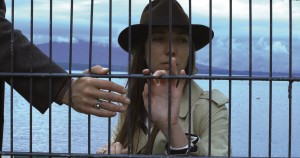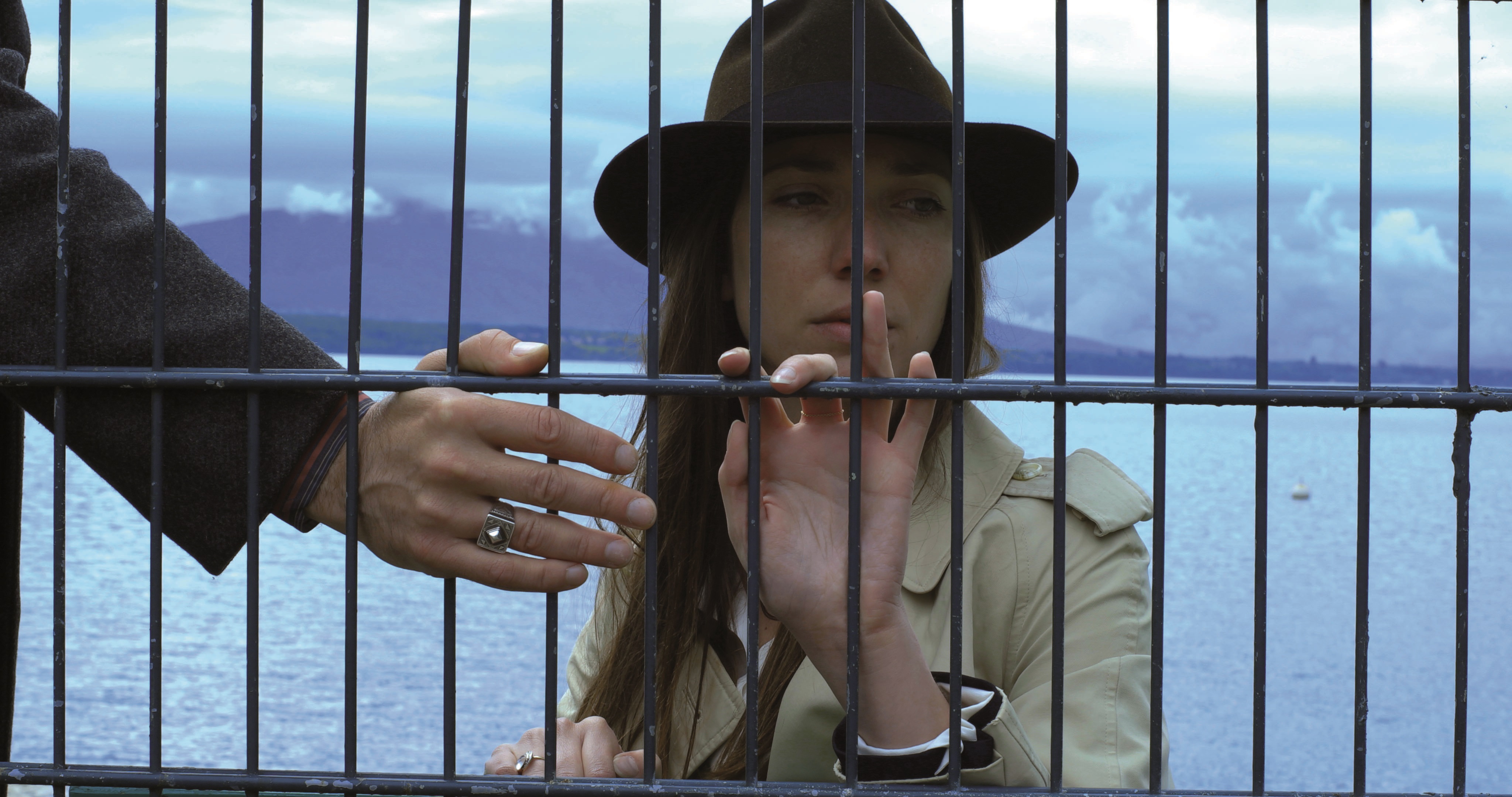 Released onto DVD and Blu-ray on 8th December 2014 is film legend Jean-Luc Godard’s first 3D effort, Goodbye To Language. It’s a film that is impossible to distil into a convenient shorthand synopsis; an assault on the senses that is worthy of repeated viewings. With heavy symbolism and an elliptical narrative, it is a feature that extends beyond its inventive application of 3D and into something greater.
Released onto DVD and Blu-ray on 8th December 2014 is film legend Jean-Luc Godard’s first 3D effort, Goodbye To Language. It’s a film that is impossible to distil into a convenient shorthand synopsis; an assault on the senses that is worthy of repeated viewings. With heavy symbolism and an elliptical narrative, it is a feature that extends beyond its inventive application of 3D and into something greater.
Front Row Reviews sat down with the two stars of the film, Kamel Abdeli and Zoe Bruneau, to talk about their experiences on working with this venerable icon. The insights are fascinating.
FRR: How did you come to be involved in the project?
Zoe Bruneau: I had a phone call from my agent, who told me that Jean-Luc Godard wanted to meet me. I was really thrilled. Then I met his assistant and we had an interview for maybe half an hour. It was a filmed interview and he sent the film to Jean-Luc. He saw the film and then he chose to meet me in person. We had a chat for about an hour and a half, and then he chose me.
What form did the interview take?
Zoe: Just question and answers about me. There was no text, nothing to learn. It was great!
Kamel Abdeli: Same for me. It was a filmed interview and then screen tests with two other girls, because they hadn’t been chosen yet.
Because it’s Godard, did you say ‘yes’ to the film before you knew what the outline would be?
Kamel: Yeah, I did the screen test before I read the script.
Zoe: Same for me. I said ‘yes’!
How do you prepare for a film like this? Because it’s a hard one to define.
Zoe: I had the scenario for 2 years before we shot. So, I had plenty of time to prepare! Time to read the scenario, then read, and then read again. And again. And again (laughs)! In the scenario, there were lots of references to authors and books, so I had the time to read the books, see the paintings and to listen to some music and everything. That was my preparation. I also did a little sport, because I knew I’d be naked!
Did Godard give you the material ie the books etc? Or did he just leave you to it?
Kamel: No, he didn’t give us any materials at all. He gave us the script and it was up to us to find whatever there was for us to find in it. A Godard script is full of stuff. It’s very, very rich. I could read it again tomorrow and find more in it.
With that in mind, do you feel like you have digested this film?
Kamel: Never!
Zoe: We’re going to see it tonight for the third time and I think I will discover a new film again. In Cannes, we saw the movie for the second time, and I discovered some stuff that I had not seen the first time. I think it’s going to be the same every time that I watch it.
Kamel: He’s one of the world’s great intellectuals. He’s a very erudite person, so it’s hard to understand everything and, for Godard, it’s hard for him to explain everything.
Is he easy to work with? Is he personable? Or does he have a distance? Is he removed?
Zoe: During the work, he’s really involved. He wants to make you arrive somewhere, so he’s talking to you, but he would never explain what he wants. He’s not going to say, ‘I want to see this’.
He’s going to tell you, ‘speak slower’, ‘lower your voice’, ‘take ten seconds between this word and this word’, ‘take 2 steps’. He will tell you what to do, but never how to get somewhere.
Then, when you cut and you are in your life and you, say, meet at the restaurant because it’s lunchtime, he’s talking to you like a normal person. But then, after this, you go back home, you never hear from him anymore. We never had a phone call or anything. During the time we were shooting and working together, we had a connection and we became, not friends, but we had a certain form of intimacy, which we never had again once we finished shooting.
I think he doesn’t care. I think he likes us, but I think his cares are far away.
The impression I gained from the film from the first time watching it is that he’s an animal lover and I think he sees the dog as a pure spirit and doesn’t really like people that much!
Kamel: (laughing) Yes, but he could be quite affectionate and tactile…
Zoe: I had a lot of cheek caresses. It was really nice! He is really benevolent. He paid great attention to me, because my grandfather died during the shooting (of the film), and he knew him because he was an editor. There were articles in lots of different newspapers, so when I arrived in the morning for the shoot I was very sad.
We did the shooting and I was, like, ‘oh okay, he doesn’t say anything’. Then, on the lunch break, I come down the stairs and I see on the table all the newspapers about my grandfather. I asked the assistant, and they said, ‘Jean-Luc kept it for you’. So, he knew. He is a real human being, who is tender and gentle.
Kamel: Yes. It’s true. He has got a gentle side and a great sense of humour. He’s very funny.
Zoe: He loves laughing. When you see him laughing, you can see that he really enjoys it!
They say that Ingmar Bergman was like that. All his films were very serious, but on set they were always joking, laughing and you don’t associate them with that. You always assume that these pre-eminent directors who create these worthy and considered pieces of art are going to be serious all the time.
Zoe: You often think the opposite with comedians though. Those people who stand up and are funny are going to be happy and, most often, they are not! You say, ‘oh, we’re going to dinner and it’s going to be so funny’ and then you get there and it’s like (motions downcast and miserable face pushing food around the plate)! So, it’s often the case that it’s other way around!
This film isn’t a commercial venture – Godard’s films never really are – but with him as the director you’re not just dealing with the here and now of commercial fortunes. These films will be returned to time and time again. What is your view on that?
Kamel: You might get 300,000 people going to see it in France when it is released, but it’s going to last 100, 200 years….
Zoe: If humanity lasts that long!
Kamel: In 50 years, students will be studying Godard and this will be on their curriculum. It’s a film that is going to have a long life.
Zoe: … And he’s the only one to use 3D in this way; to change the point of view, to use two eyes, to separate… He once again innovates. He’s not just using 3D in the way that the audience goes, ‘oh, it’s coming into my face’.
What’s your opinion of French cinema generally in this age? We look at Godard’s advancing age and then those other Titans of yesteryear; Truffaut, Rohmer. Who are the next greats? Kerchiche, perhaps?
Zoe: I think there is a new New Wave in (French) cinema. There are lots of new filmmakers coming out like Thomas Cailley, who has done Les Combattants (2014), which was in the Camera d’Or competition at Cannes this year. There is another film called Party Girl (2014) from 3 French directors, who are only 30 years old. I think they are the new filmmakers. And then a girl like Celine Sciamma (Girlhood), who I think is really brilliant in inventing and building her characters.
It’s not comparable to someone like Godard, because Godard is Godard, and he is so particular. There is no new Godard. It is not possible. No one can copy him because it is so unique, but there is a new form of expression and a new form of cinema coming out of France.
Goodbye To Language is released on DVD and Blu-ray on 8th December 2014.




